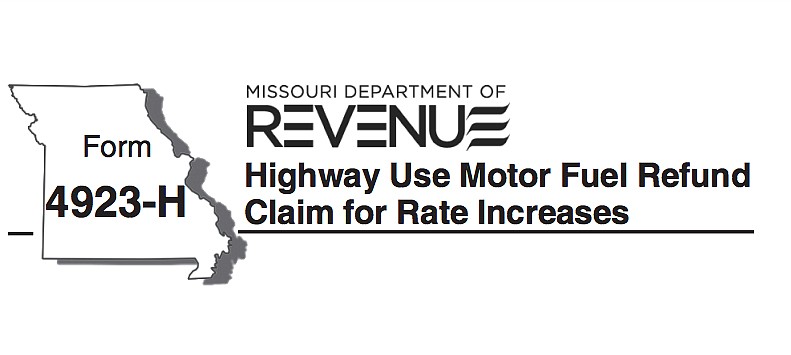The Missouri Department of Revenue will begin accepting gas tax refund claims July 1. So how do you get one?
DOR has created a paper refund claim form -- 4923-H Highway Use Motor Fuel Refund Claim for Rate Increases -- and is developing an electronic process to file a claim online. The online process is suggested for more efficient processing of claims, according to the department's website.
Anne Marie Moy, director of strategy and communications, said DOR has been preparing to receive the claim forms and is still finalizing the online filing system.
"Taxpayers can submit the Form 4923H and supporting worksheets to the department via email," she said. "There will also be an Excel upload option."
Missouri increased its tax rate on gasoline in 2021, phasing implementation by 2.5 cents per gallon each year until 2025 for a total increase of 12.5 cents per gallon. The first 2.5-cent tax increase took effect in October 2021 and the next increase is slated for July 1.
The legislation enacting the tax increase allows for Missourians to opt out by submitting a claim to DOR for a refund. The department will accept the refund claims from July 1-Sept. 30.
Motorists seeking a refund can file a claim for only the amount of fuel taxes paid since the increase last October and only for the amount of the tax increase. The legislation isn't retroactive, meaning Missouri motorists can only be exempt from paying the amount that fuel taxes have increased, not the state's full fuel tax.
The refund form includes a worksheet that asks the purchaser to list when the fuel was purchased, the seller name and address, number of gallons purchased and the amount of state fuel tax increase they paid each purchase. The amount of taxes paid often isn't listed on receipts, according to the department, so those submitting a claim should calculate it themselves.
The claim form worksheet is required so motorists don't have to submit their gas receipts when filing for a refund. The department does recommend keeping fuel receipts for three years, however, so it can review claims.
A separate worksheet needs to be completed for each vehicle a driver is seeking to make a tax refund claim for. Claims can only be made for vehicles that weigh 26,000 pounds or less, ruling out many large, commercial vehicles such as dump trucks, buses and construction trucks. Many of those commercial vehicles have a separate fuel tax exemption process.
DOR will return unsigned claims to the sender, but claims that are postmarked before July 1 or after Sept. 30 will be denied.
A surviving spouse or estate can file refund claims for deceased drivers. DOR requires proof of death -- such as a copy of the death certificate or obituary -- and a copy of the individual's will or trust to be submitted with the claim forms.
According to the fiscal note attached to the legislation when passed, 23 additional staff are required within DOR to process motor fuel tax refund claims this year.
A provision in the legislation requires the department to pay interest on refunds it doesn't return within 45 days. The interest rate, set by the state director of revenue, is currently 0.4 percent.
The state Budget and Planning Office's fiscal analysis of the legislation projects 15-100 percent of qualified fuel tax purchases may be refunded. At 15 percent, the state would be refunding $11.7 million and at 100 percent the state would be refunding $78 million.
"The number of refund applications could vary substantially," the fiscal note states.

